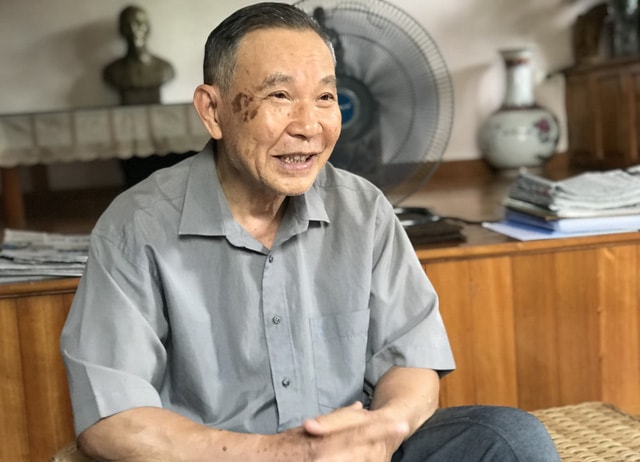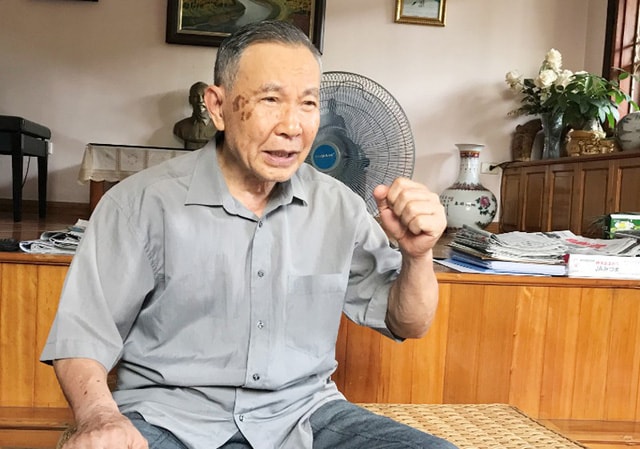“Ask the people to know which comrades… have not been exposed”
Former member of the Party Central Committee, Deputy Head of the Central Inspection Committee Vu Quoc Hung raised the issue that in the future, the Central Committee itself, including functional agencies such as the Inspection Committee, must know which comrades "have not been exposed".
The Secretary is not "plump"
- The arrangement of Party Secretaries at provincial and district levels who are not local people is receiving high approval from the Central Committee when discussing the Project on building a team of strategic-level cadres. How do you evaluate the ability of this solution to help prevent the situation of forming cliques, forming cliques, being familiar with each other, being close to each other, etc.?
- Actually, this policy is nothing new. Our ancestors have applied it since ancient times. This plan is good, I support it, but its disadvantage is that if people are not good-hearted, whether they are local or from other places, they will still take advantage.
What people care about most is whether leaders are cultivating personal interests, building mansions, and using "sensitive" means to bring their children into the government. If you come from another place and have no relatives there, or have relatives but are not related, you will be more at ease when dealing with personal matters that could be the seeds of profiteering.
However, if there are bad intentions, cadres can also connect with each other to make profits or find ways to bargain with each other "you help my child, I will help you". All of these issues need to be considered and calculated by the Central Government to prevent violations in advance, so as not to make mistakes right from the regulations, so that cadres when implementing that policy do not have the conditions to take advantage and lose themselves.
- A counter-argument worth pondering is that the term-based mindset is likely to appear in a Secretary who goes to work in another locality. That cadre will have the mentality of just "living on hold" waiting for further promotion, so he needs to be well-rounded to win the favor and support of the locality. Does that still lead to deference and sentimentality when making decisions?
- That's also possible, because of the mindset of a term, one should live a full life, with an agreement like "I won't touch you, you won't touch me", and then after a term, I come back and receive very... full comments.
However, the Central Committee must also consider evaluating cadres based on their achievements and work results. In that case, being “perfect” is not enough. When you become a local leader, you must create a team of clean and active cadres. The cadre must make that locality stronger, and to strengthen it first means creating a team of united and unanimous cadres. If you are a Secretary but just keep it perfect and close the door, then you will be… useless.
 |
| Former Deputy Head of the Central Inspection Committee Vu Quoc Hung. |
Who is the “unknown” person?
- Controlling power is an important goal of the project. How do you evaluate the cage design to "lock" power here?
- I think that if the Central regulations are strictly implemented, they will "lock up" power. Now we have to choose the person who can "cage" power, monitor and lock that power. Our nation's history has gone through many eras, many kings, and honest kings have all been able to win people's hearts, that is the person who can "cage" power.
This Central Conference is not a table to create slogans, but a table to create tools, regulations, institutions, and create foundations to produce “cages” to imprison power. However, it is also necessary to train people to use those “cages” of power. That is the strategic-level cadres, because the most important issue is still people.
The criteria for cadres are now more and more specific, this time it is even more specific so I believe it can be done.
- So, in your opinion, with this project on strategic-level cadres, do people have the right to believe that the country will have an elite team?
- The Central Committee is discussing that. All the people in the conference are discussing how to choose the country's elite, but whether all the people sitting there are elite or not, we need to prove it by reality and ask the people to know.
The “comrades who have been exposed” in the past are those who are not worthy. Whether there are people in the Central Committee who have “not been exposed” is not known yet. The Central Committee itself, including the functional agencies, such as the Central Inspection Committee, must know this. And if you want to know, you have to ask the people. Nothing can be hidden from the people.
- You just mentioned the phenomenon of unworthy officials entering the Central Committee that has only recently been exposed and discovered. Some say that this is because the Party's inspection work in the recent past has been lax and not strictly implemented. Compared to when you were still working, how do you evaluate the current inspection work?
All comparisons are lame, but it can be seen that when we worked, the regulations were still very rudimentary, not many. At that time, the market mechanism had not yet penetrated deeply into life, money and its attraction were not as profound as they are now, so the mistakes of officials were still limited.
At that time, we saw something and did it immediately. We listened to everyone and when we saw a problem or public opinion, we brought it up on the agenda for consideration. So there were many things that we promptly prevented from happening again.
But it must also be said that the inspection and supervision work is not only the work of the Inspection Committee but also the work of the Party, first of all the Party Committees and Party Secretaries at all levels are the first to take action.
So what do you think about the proposal to strengthen the authority of the party inspection agency as a solution to strengthen the management and control of cadres?
Increasing authority is also a good direction, so that the decision-making power of the inspection agency is more direct, without having to go through "intermediate level". But that also needs to be considered from many angles. If we want to increase authority, the Inspection Committees at all levels must also have a very high level of responsibility.
Currently, to discipline a member of the Central Committee, it is necessary to go through the Central Executive Committee. To discipline cadres under the management of the Politburo and the Secretariat, the Central Inspection Committee can only propose. So if there is a way for the Inspection Committee to do that, it will reduce the need to "ask for help".
But actually, it is not too complicated or cumbersome. The problem is not to "punish" the case severely but to point out the mistakes of the officials. That is the basic step.
To be a cadre must have integrity
- The strategic cadre project also sets the goal that after the 7th Central Conference, a culture of saying no to power and position seeking and a culture of resignation will be formed, which not many cadres are currently interested in?
- I strongly support the culture of resignation. I have emphasized that officials must have integrity, when they can no longer do their job, they should resign, stating clearly the reasons: health, qualifications or loss of prestige. It should be done like that. This is not a terrible thing in the world. There should be regulations to encourage those who cannot do their job to resign, in addition to regulations on dismissal, removal, and removal...
 |
| Mr. Vu Quoc Hung: "The problem with resigning is just self-respect." |
- So is there anything in the current mechanism that prevents leaders from resigning that makes so few people choose this honorable path, such that a Deputy Minister submitted his resignation after receiving a disciplinary sentence, and a Deputy Secretary of the Provincial Party Committee and Head of the Provincial National Assembly Delegation had to wait until he was disciplined before submitting his resignation as a delegate?
- Actually, I don't see any problem with the mechanism. The problem is self-respect. If I were that person, I would have to report to the organization. I know that I am like a fish on a chopping board, but if I still act as a representative to meet voters, I would not only be making a fool of myself but also making the organization a fool of myself. I should have asked to be absent from the voter meeting and announced that I had written a letter of resignation from the National Assembly, that would be correct.
In our Party during the land reform period, there were also some cadres who resigned, such as Mr. Hoang Quoc Viet asked to withdraw from the Politburo, Mr. Ho Viet Thang asked to leave the Politburo Standing Committee, General Secretary Truong Chinh asked to resign...
Thank you!


